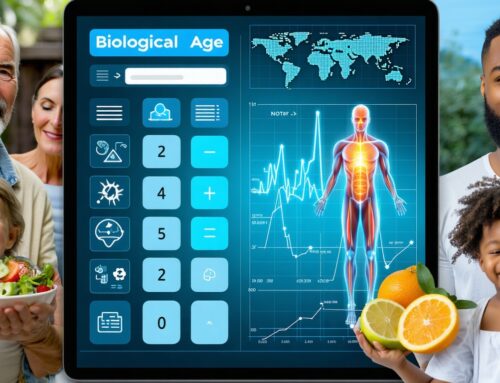Understanding Biological Age
Biological Age vs Chronological Age
Alright, let’s break it down. You’ve got your chronological age, which is just the number of candles on your birthday cake. But then there’s your biological age, which is like the secret sauce of aging. It’s all about how your body is holding up, considering things like your genes, lifestyle, and the environment. So, while you might be 40 in years, your body could be feeling like it’s 30—or, heaven forbid, 50—depending on how you’ve been treating it (Mayo Clinic).
Biological age is the real MVP when it comes to understanding your health. It’s influenced by everything from your grandma’s genes to whether you choose kale over cake. Two folks born on the same day might be aging at totally different speeds because of their habits and genetic quirks.
| Age Type | Definition |
|---|---|
| Chronological Age | Number of years since birth |
| Biological Age | Age based on physiological and molecular markers |
Curious about how to figure out your biological age? Check out our guide on biological age assessment tools.
Factors Influencing Biological Age
So, what makes your biological age tick? Here’s the scoop on what can speed up or slow down your body’s aging clock.
-
Genetics: Your DNA is like a blueprint, but it only accounts for about 15% to 25% of how you age. Some folks are just born lucky, while others might have to work a bit harder to keep the wrinkles at bay.
-
DNA Damage and Oxidative Stress: Life’s wear and tear can mess with your DNA. When free radicals outnumber antioxidants, it’s like a party gone wrong, speeding up the aging process.
-
Telomere Erosion: Think of telomeres as the plastic tips on shoelaces. They keep your chromosomes from fraying, but they get shorter with each cell division. Short telomeres are like a ticking clock for aging. Dive into the nitty-gritty in our article on biological age and telomeres.
-
Senescent Cells: These are the grumpy old cells that refuse to die. They hang around, causing trouble and inflammation, like that one relative who overstays their welcome.
-
Chronic Inflammation: “Inflammaging” is the fancy term for ongoing inflammation that speeds up aging and invites diseases to the party. Check out how inflammation affects aging in our article on biological age and inflammation.
-
Lifestyle Habits: Your daily choices—what you eat, how much you move, and how well you sleep—are huge players in your biological age game. Want to turn back the clock? Peek at our tips on biological age and diet, biological age and exercise, and biological age and sleep.
-
Social Connectedness: Having a solid crew can keep you young at heart. Good friends help reduce stress and boost your mood, which is a win for your biological age.
-
Environmental Factors: Living in a smoggy city or being around toxins can age you faster. Cleaning up your environment can help keep you feeling spry. Learn more about these factors in our articles on biological age and pesticides, biological age and plastics, and biological age and phthalates.
By getting a handle on what affects your biological age, you can make smart moves to stay healthy and feel great. For more on calculating your biological age, check out our guide on how to calculate biological age.
Biomarkers for Biological Age
Getting a grip on the markers that tell your biological age can give you a peek into your health and how long you might stick around. Let’s chat about three big players: telomere length, epigenetic clocks, and transcriptomic predictors.
Telomere Length
Think of telomeres as the little hats on the ends of your chromosomes. They get shorter as you get older. Scientists have been all over this, linking short telomeres to a higher chance of kicking the bucket, cancer, heart problems, and brain stuff like Alzheimer’s and Parkinson’s. Basically, shorter telomeres aren’t your friend.
| Health Outcome | What Short Telomeres Mean |
|---|---|
| Mortality Risk | Higher chance of dying sooner |
| Cancer | More likely to develop cancer |
| Cardiovascular Disease | Increased risk of heart issues |
| Alzheimer’s Disease | Greater risk of Alzheimer’s |
| Parkinson’s Disease | Higher chance of Parkinson’s |
Curious about how telomeres play into your biological age? Check out our article on biological age and telomeres.
Epigenetic Clocks
These clocks are like DNA fortune tellers, using methylation levels to guess your biological age. They’re pretty spot-on and can even predict when you might meet your maker or get certain diseases. There are a bunch of these clocks, like the Horvath and Hannum clocks, each with its own quirks and tissue preferences (NCBI).
| Epigenetic Clock | What It Does |
|---|---|
| Horvath Clock | Checks DNA methylation in various tissues |
| Hannum Clock | Zeroes in on blood-based DNA methylation |
Want the lowdown on how these clocks tick? Dive into our guide on epigenetic clocks.
Transcriptomic Predictors
These predictors look at how your genes are chatting and link that to age-related stuff and health. They’ve been tested in different groups and can give a good guess at your biological age (NCBI).
| Predictor | What It Tells You |
|---|---|
| Gene Expression Profiles | Predicts age-related traits and health outcomes |
For more on how gene talk affects your biological age, swing by our page on biological age assessment tools.
Knowing these markers can help you keep tabs on your biological age and make smart choices about your health. Check out our resources on how to calculate biological age and biological age testing methods to get started.
Tools for Measuring Biological Age
Getting a grip on your biological age can spill the beans on your health and how long you might stick around. There are a bunch of ways to measure it, each with its own quirks and perks. Let’s dive into three big players: epigenetic clocks, allostatic load indices, and functional age estimators.
Epigenetic Clocks in Depth
Epigenetic clocks are like the Sherlock Holmes of biological age measurement. They snoop around your DNA methylation in blood, which changes as you age. These clocks are pretty spot-on, predicting stuff like when you might kick the bucket, your chances of getting diseases like breast cancer, and even if you’re likely to feel down in the dumps—way better than just counting birthdays (Harvard Bioethics Journal).
| Epigenetic Clock | Accuracy | Predicts Mortality | Predicts Disease Risk |
|---|---|---|---|
| Horvath Clock | High | Yes | Yes |
| Hannum Clock | High | Yes | Yes |
| PhenoAge | Very High | Yes | Yes |
Curious about how these clocks tick? Check out our guide on biological age and telomeres.
Allostatic Load Indices
Allostatic load indices are like a report card for how much stress your body’s been under. They tally up stuff like blood pressure, cholesterol, and inflammation. If your allostatic load is high, you might be in hot water, with a higher chance of checking out early. Each bump in your score ups your odds of mortality by 3.3 times.
| Allostatic Load Component | Measurement | Impact on Health |
|---|---|---|
| Blood Pressure | mmHg | Cardiovascular Health |
| Cholesterol Levels | mg/dL | Heart Disease Risk |
| Inflammatory Markers | CRP Levels | Inflammation |
Want to know how your lifestyle can mess with your allostatic load? Peek at our article on biological age and stress.
Functional Age Estimators
Functional age estimators, like the frailty index, size up your biological age based on how well your body’s holding up. They look at stuff like how you move, any chronic illnesses, and your brainpower. A 1-point jump in the frailty index means a 21.2% higher chance of kicking the bucket in the next 70 months (NCBI).
| Functional Age Estimator | Components | Predicts Mortality |
|---|---|---|
| Frailty Index | Health Deficits | Yes |
| Gait Speed | Walking Speed | Yes |
| Grip Strength | Hand Strength | Yes |
For tips on keeping your body in tip-top shape, check out our articles on biological age and exercise and biological age and diet.
By using these tools, you can get a handle on your biological age and take steps to boost your health and stick around longer. For a tailor-made assessment, try out a biological age calculator and explore different biological age assessment tools available.
Impact of Lifestyle on Biological Age
Your lifestyle choices are like the secret sauce that determines your biological age. Knowing how your social life, daily habits, and surroundings affect your biological age can help you make smart choices to keep aging gracefully.
Social Connectedness
Having a solid social circle is like having a magic potion for aging. People with strong friendships and family ties tend to stay sharp and age like fine wine. On the flip side, folks who feel like they’re on a deserted island might find themselves biologically older than their actual age. Sharing your life with a partner, having a job, and not worrying about money can lower the risk of chronic diseases and add years to your life.
Lifestyle Habits
Your everyday habits are the real game-changers for your biological age. Stress, smoking, drinking, exercise, and what you eat all play a big part in how you age. Getting off the couch, eating your veggies, and keeping stress in check can slow down the ticking clock. Curious about how these habits affect your biological age? Dive into our articles on biological age and diet, biological age and exercise, and biological age and stress.
Environmental Factors
Your surroundings also have a say in your biological age. Things like your income, education, and where you live shape the choices you make for healthy aging. People with more money in the bank often live in lively places, have better access to doctors, and make healthier choices, leading to better health (NCBI). But watch out for nasty stuff like pollution and toxins—they can speed up the aging process. Want to know more about how your environment affects aging? Check out our articles on biological age and pesticides, biological age and plastics, and biological age and phthalates.
By getting the scoop on how your social life, habits, and environment impact your biological age, you can take charge of your aging journey and boost your well-being. For a full rundown of your biological age, try out a biological age calculator and explore different biological age assessment tools.
Biological Age and Health Outcomes
Predicting Disease Risk
So, you’re curious about how your body’s real age stacks up against the number on your birth certificate? Well, understanding the difference between biological age and chronological age is like having a crystal ball for your health. Biological age gives you the lowdown on your body’s actual condition, which can be a better health predictor than just counting candles on your birthday cake. Things like your genes, DNA wear and tear, stress from those late-night Netflix binges, and even how your cells are holding up all play a part in figuring out your biological age (Mayo Clinic).
Thanks to some cool science in epigenetics, we now have these nifty epigenetic clocks. They check out DNA methylation in your blood and are pretty spot-on at guessing your biological age. These clocks can even give you a heads-up on risks for stuff like breast cancer and feeling blue, way better than just looking at your chronological age (Harvard Bioethics Journal). For example, if a woman’s biological age is five years older than her chronological age, her breast cancer risk jumps by 15% (Journal of the National Cancer Institute).
| Disease | Increased Risk per 5 Years of Higher Biological Age |
|---|---|
| Breast Cancer | 15% |
| Depressive Symptoms | Higher risk (specific percentage not provided) |
Want to get a handle on your own risk? Check out a biological age calculator and dive into some biological age assessment tools.
Mortality and Biological Age
Biological age isn’t just a number; it’s a crystal ball for your lifespan. Folks with a biological age that’s higher than their chronological age tend to have a higher risk of kicking the bucket sooner. That’s because biological age factors in everything from your lifestyle choices to the environment you live in and even your genetic luck.
Epigenetic clocks, those handy tools for measuring biological age, have shown they can predict mortality better than just counting the years you’ve been around. By looking at DNA methylation patterns, these clocks give you a peek into how well your body is holding up and how long it might last.
| Age Measure | Predictive Accuracy for Mortality |
|---|---|
| Chronological Age | Lower |
| Biological Age (Epigenetic Clocks) | Higher |
Curious about how your daily habits affect your biological age? Check out our articles on biological age and diet, biological age and exercise, and biological age and stress. By making smart choices, you might just turn back the clock on your biological age and boost your health game.
Advances in Biological Age Research
Epigenetic Clocks and Disease
Epigenetic clocks are like the new-age fortune tellers of the science world, giving you a peek into your biological age by measuring DNA methylation levels in your blood. Forget the candles on your birthday cake; these clocks can predict how your body’s holding up better than your actual age. According to the Harvard Bioethics Journal, they can even forecast your risk of kicking the bucket, getting sick, or feeling blue.
Take breast cancer, for example. A study in the Journal of the National Cancer Institute found that if a woman’s biological age is five years ahead of her chronological age, her breast cancer risk jumps by 15%. It’s like your body’s secret way of saying, “Hey, pay attention to me!”
And it’s not just physical health. The American Journal of Psychiatry points out that folks with major depression might be biologically older than they look. So, biological age could be the new crystal ball for predicting health outcomes.
Genetic Factors in Aging
Your genes are the backstage crew in the aging show, pulling strings on your biological age. While your chronological age is just a number, your biological age is the sum of your genes, environment, and lifestyle choices. Recent genetic research is uncovering how specific genes play their part in the aging drama.
Take telomeres, those little caps at the ends of your chromosomes. Short telomeres are like frayed shoelaces, signaling faster aging and a higher chance of age-related diseases. Understanding the genetic factors that affect telomere length can give you a heads-up on your biological age (Nature Medicine).
Plus, scientists have pinpointed genes that manage cellular processes tied to aging, like DNA repair, inflammation, and oxidative stress. By studying these genes, they aim to craft interventions that slow aging and boost health.
Curious about measuring your biological age? Check out our articles on biological age calculator and biological age assessment tools.
Keeping up with the latest in biological age research can help you take charge of your health. Knowing how your genes and lifestyle choices interact can guide you in making decisions that support a long, healthy life. For more on how lifestyle affects biological age, dive into our articles on biological age and diet, biological age and exercise, and biological age and stress.







